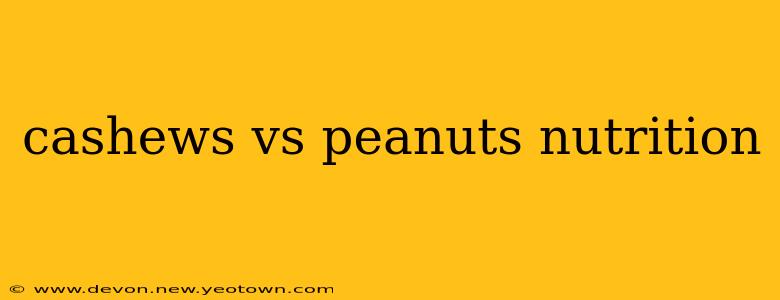Cashews vs. Peanuts: A Nutritional Showdown!
The snack aisle beckons with its tempting array of nuts, but choosing between cashews and peanuts can feel like a nutritional tug-of-war. Both offer satisfying crunch and a protein boost, but which one emerges victorious in the battle of the nuts? Let's dive into a detailed comparison to settle the score once and for all. This isn't just a simple calorie count; we'll explore the nuances of their nutritional profiles, highlighting what each nut brings to the table (or, perhaps more accurately, the snack bowl).
What are the main nutritional differences between cashews and peanuts?
This is a question at the heart of the matter. Imagine this: you're preparing for a long hike, and you need a nutritious snack to keep your energy levels up. Do you reach for the bag of cashews or the peanuts? The answer depends on your specific needs.
Cashews, with their signature kidney shape and creamy texture, boast a higher fat content, much of it being the healthy monounsaturated kind. This translates to a richer, more calorie-dense snack. They also stand out with a significant amount of magnesium, an essential mineral for muscle function and energy production. Peanuts, on the other hand, are slightly lower in fat but offer a more substantial dose of protein and fiber, contributing to satiety and digestive health. They also pack a bigger punch of vitamin E, a powerful antioxidant.
Are cashews or peanuts healthier?
There’s no single "healthier" nut; it all depends on individual dietary needs and preferences. Both cashews and peanuts offer a range of health benefits. Cashews, with their higher monounsaturated fat content, can contribute to healthy cholesterol levels. Peanuts, with their higher fiber and protein, aid in blood sugar regulation and help you feel fuller for longer. The key is moderation and incorporating a variety of nuts into your diet for a balanced nutritional intake.
Which nut is higher in protein?
While both are sources of protein, peanuts win this round. A serving of peanuts generally offers a noticeably higher amount of protein compared to an equivalent serving of cashews. This makes peanuts a more appealing choice for those focusing on building and maintaining muscle mass.
Which nut has more calories?
This might seem straightforward, but the reality is slightly nuanced. While both are calorie-dense, cashews tend to have slightly more calories per serving due to their higher fat content. However, the calorie difference isn’t drastic, and the overall energy provided by both nuts is substantial.
Which nut is better for weight loss?
Neither nut is inherently "better" for weight loss. Both cashews and peanuts are calorie-dense, and overconsumption can lead to weight gain. The key here is portion control. Include them as part of a balanced diet, mindful of your overall calorie intake. The fiber in peanuts might contribute slightly more to satiety, potentially helping with appetite control.
Do cashews or peanuts have more fiber?
This is another area where peanuts take the lead. Their fiber content is noticeably higher than that of cashews, contributing to improved digestive health and a feeling of fullness.
Are cashews or peanuts better for heart health?
Both cashews and peanuts can be beneficial for heart health, albeit through different mechanisms. The monounsaturated fats in cashews contribute to healthy cholesterol levels. The fiber and other nutrients in peanuts also support cardiovascular health. The "better" nut depends on your individual needs and existing health conditions. Always consult your doctor or a registered dietitian for personalized advice.
In Conclusion:
The "cashews vs. peanuts" debate isn't about finding a clear winner. Both nuts are nutritious and offer unique benefits. The best choice depends on your individual dietary goals and preferences. Incorporating both into your diet, in moderation, can contribute to a balanced and healthy eating pattern. Remember, variety is key to a nutritious diet!

